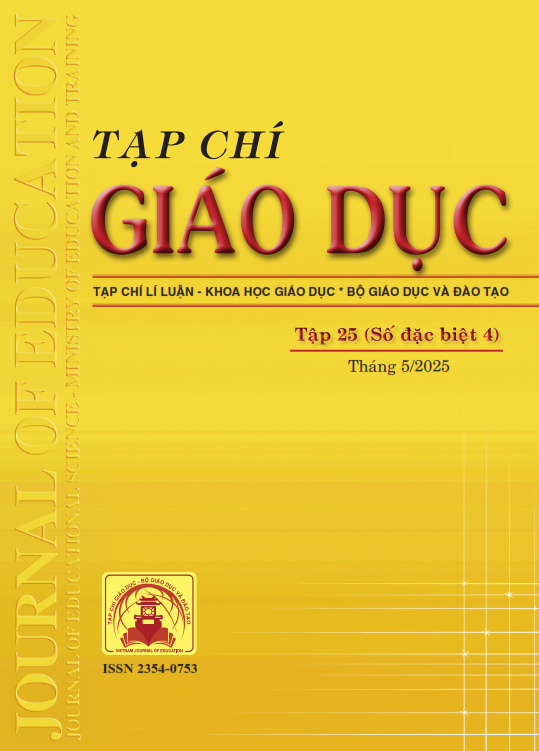Phát triển biểu tượng hình dạng cho trẻ mẫu giáo 3-4 tuổi qua trò chơi học tập: Nguyên tắc và biện pháp
Tóm tắt
Learning games play an active role in developing children's shape symbols through observation, experience and interaction with visual elements. The article analyzes the role, principles and proposes some groups of measures to develop shape symbols through learning games for 3-4 year old preschool children. Integrating educational games into daily activities not only helps children acquire knowledge but also improves the overall education quality, helping children develop physically and mentally. However, to achieve optimal results, teachers need to choose games suitable for each age, consider the difficulty level of the task and create a learning environment that encourages children's initiative.
Tài liệu tham khảo
Barrett, J. S., & Clements, D. H. (2003). Teaching and learning about geometric shapes: A research-based approach. Teaching Children Mathematics, 9(8), 482-487.
Bộ GD-ĐT (2021). Chương trình giáo dục mầm non (ban hành kèm theo Thông tư số 01/VBHN-BGDĐT ngày 13/4/2021 của Bộ trưởng Bộ GD-ĐT).
Đỗ Thị Minh Liên (2011). Giáo trình phương pháp cho trẻ mầm non làm quen với toán. NXB Giáo dục Việt Nam.
Hồ Thị Mai Phương, Hoàng Thị Tú, Trần Nguyệt Anh (2017). Thiết kế và tổ chức trò chơi học tập trong hình thành biểu tượng toán học sơ đẳng cho trẻ mẫu giáo. Tạp chí Khoa học và Công nghệ, 172(12/2), 205-210.
Lê Thị Thanh Sang (2018). Tổ chức trò chơi học tập khám phá khoa học cho trẻ khiếm thính 5-6 tuổi. Tạp chí Giáo dục, 443, 11-14; 46.
Luebbe, D. (2024). The power of play-based learning in early childhood education. Concordia University, Nebraska. https://www.cune.edu/news/power-play-based-learning-early-childhood-education
Petrovska, S., Sivevska, D., & Cackov, O. (2000). Role of the game in the development of preschool child. Procedia - Social and Behavioral Sciences, 92, 880-884.
Robson, J., & LeVoguer, M. (2024). Reflections from the higher education classroom: The role of playful pedagogy in the professional formation of early childhood students. European Early Childhood Education Research Journal, 33(2), 275-286. https://doi.org/10.1080/1350293X.2024.2431538
Sarama, J., & Clements, D. H. (2009). Early childhood mathematics education research: Learning trajectories for young children. Routledge.
Smith, L. B. (2005). Shape: A developmental product of attention and learning. Current Directions in Psychological Science, 14(1), 21-25.
Vogt, F., Hauser, B., Stebler, R., Rechsteiner, K., & Urech, C. (2018). Learning through play: Pedagogy and learning outcomes in early childhood mathematics. European Early Childhood Education Research Journal, 26(4), 589-603. https://doi.org/10.1080/1350293X.2018.1487160
Vũ Minh Hồng (1980). Trò chơi học tập. NXB Giáo dục.
Vũ Thị Diệu Thúy, Đinh Thị Hồng Loan, Bùi Hương Giang (2021). Một số biện pháp hình thành biểu tượng hình dạng cho trẻ 5-6 tuổi. Tạp chí Khoa học, Trường Đại học Tân Trào, 23, 111-119.
Đã Xuất bản
Cách trích dẫn
Số
Chuyên mục
Giấy phép

Tác phẩm này được cấp phép theo Ghi nhận tác giả của Creative Commons Giấy phép quốc tế 4.0 .












